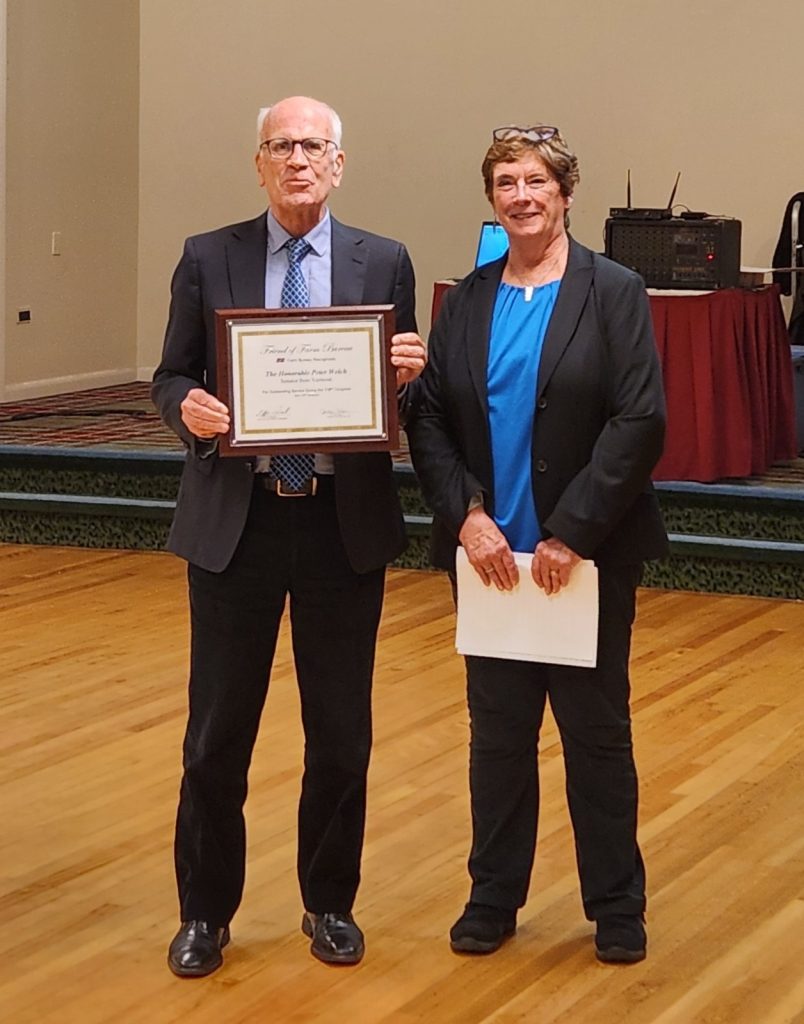Welch Joins Vermont Farmers and Agriculture Leaders in Fairlee
FAIRLEE, VT – U.S. Senator Peter Welch (D-Vt.), Chair of the Senate Agriculture Subcommittee on Rural Development and Energy, was awarded the American Farm Bureau Federation’s “Friend of the Farm Bureau” Award for the 118th Congress for his leadership and commitment to Vermont’s farmers and rural communities. Senator Welch accepted the award at the Vermont Farm Bureau’s annual dinner in Fairlee.
“Agriculture is at the heart of what makes Vermont special— our sense of community, our working lands, and neighbors feeding neighbors. But this important part of our State’s culture has been threatened by market pressures and back-to-back floods, which have made it tough for rural families to make ends meet and farmers to stay in business. I’m fighting in Washington to help and will keep working to support Vermont farmers, farmworkers, and families,” said Senator Welch.
View photos from the event below:

Senator Welch earned the “Friend of the Farm Bureau” award for his dedication and commitment to Vermont’s farmers, agricultural industry, and rural communities. He was nominated by the Vermont Farm Bureau.
At the event, Senator Welch highlighted the urgent need to pass a bipartisan Farm Bill to help farmers keep farming and put food on the table for families across America. The Senate’s draft Farm Bill, the Rural Prosperity and Food Security Act, includes several priorities championed by Sen. Welch that will strengthen Vermont’s farms, rural communities, and families, including:
- The Fairness for Small-Scale Farmers and Ranchers Act, bicameral legislation to promote competition in livestock markets by expanding grant and loan programs for small and midsized processors.
- The Farmland Access Act, legislation to improve Agricultural Conservation Easement Program (ACEP) entity certification and buy-protect-sell provisions to help protect American farmland for its intended use and expand access to farming for the next generation.
- The Future Farmers and Ranchers of Tomorrow Act, bicameral legislation to increase access to U.S. Department of Agriculture (USDA) programs for young and new farmers by revising USDA’s “qualified beginning farmer or rancher” definition to allow non-related beginning farmers and ranchers in joint entities to be eligible for FSA loans.
- The Building Up Farmland Frontiers for Ecological Resilience (BUFFER) Act, legislation to remove barriers for Vermont farmers to enter the Conservation Reserve Enhancement Program to help protect farmland from flooding and erosion.
- The O DAIRY Act, legislation to improve collection of organic dairy market data.
- The Dairy Business Innovation Act, led by Sen. Tammy Baldwin and co-sponsored by Sen. Welch, to reauthorize and increase authorization from $20 million to $36 million for the Dairy Business Innovation (DBI) Initiatives program. This funding supports DBI Initiatives programs, including the Vermont-based Northeast Dairy Business Innovation Cener (NE-DBIC) which provides grants and technical assistance to dairy farmers and processors in the Northeast.
- The Withstanding Extreme Agricultural Threats by Harvesting Economic Resilience (WEATHER) Act, legislation that would direct the USDA’s Risk Management Agency to research and develop a multiperil index crop insurance policy. The WEATHER Act was introduced following the catastrophic flooding in Vermont in July 2023 and would better support farmers facing income losses after extreme weather events.
- The ReConnecting Rural America Act, bipartisan legislation that would codify and clarify components of USDA’s ReConnect Loan and Grant Program and, in so doing, reduce red tape, and speed broadband deployment.
The Rural Prosperity and Food Security Act contains more than 100 pieces of legislation that aim to support our farms, create jobs, improve rural infrastructure, expand access to childcare and health care, support rural education and skills training, build out high-speed rural broadband, help build more affordable housing in rural America, assist homeowners and farms transition to greener energy and lower their utility bills, clean up our drinking water, conserve our land, and more.
###
